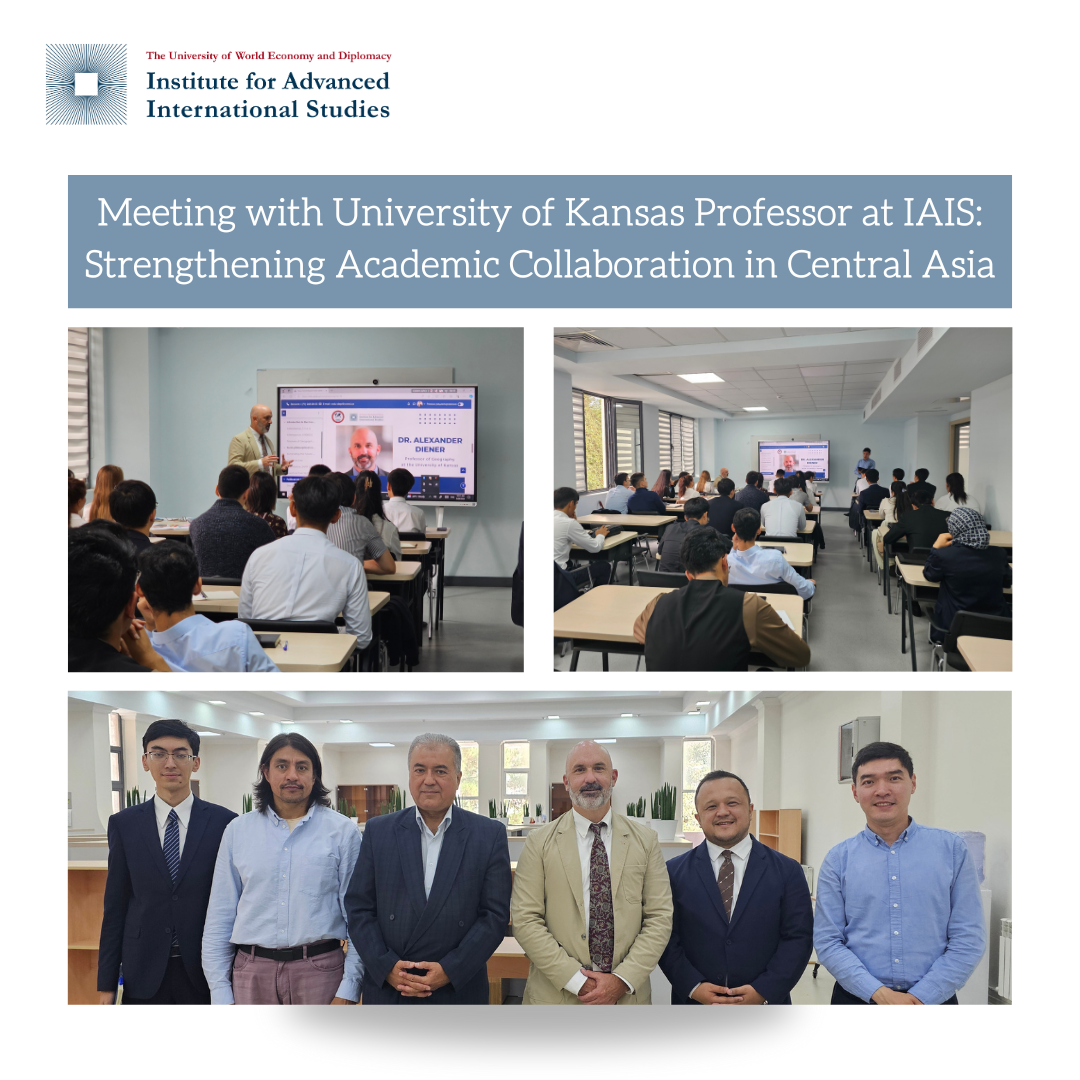
On 26 September this year, a pivotal meeting took place at the Institute for Advanced International Studies at the University of World Economy and Diplomacy (IAIS UWED), where Professor Alexander Diener, a distinguished geographer from the University of Kansas, and Maksat Koshkarbayev, a representative of American Councils, were welcomed by the leadership and staff of the IAIS. The meeting centred on exploring the prospects for expanding bilateral academic cooperation and fostering regional collaboration in Central Asia, with a particular emphasis on research and educational initiatives.
The Deputy Director of IAIS, Shakhboz Akhmedov, led the discussions by providing a comprehensive presentation of the Institute’s mission and activities. He highlighted the wide-ranging research areas currently being undertaken at IAIS, with a specific focus on the study of Afghanistan and the burgeoning field of American Studies. Mr. Akhmedov also outlined the Institute’s ambitious plans for expanding its research programmes, enhancing its academic output, and strengthening international partnerships. During the meeting, the guests were given an in-depth introduction to the various projects and initiatives currently being pursued by IAIS, showcasing the Institute’s role as one of the leading centres for international studies in Central Asia.
Maksat Koshkarbayev followed Mr. Akhmedov’s presentation by introducing the US-Central Asia Research Network (US-CARNet), a key programme under the auspices of American Councils. This programme is designed to promote collaboration between scholars and experts from Central Asia and the United States, with a particular focus on shared regional interests. Mr. Koshkarbayev explained how the initiative facilitates joint research projects and scholarly exchanges, particularly in the areas of China’s growing influence in Central Asia, security issues, and other critical topics affecting the region. The US-CARNet programme has emerged as a cornerstone for academic dialogue between Central Asia and the US, helping to bridge gaps in research and encourage mutual understanding.
The meeting then turned to a discussion of future areas of cooperation between IAIS and the University of Kansas, alongside other academic and research institutions in the United States. Professor Diener expressed his keen interest in exploring opportunities for collaboration and participation in upcoming events hosted by IAIS. He stressed the importance of continued engagement between scholars from the United States and Central Asia, particularly in the context of a rapidly changing geopolitical landscape. Prof. Diener also noted that fostering academic dialogue between these regions is essential for addressing common challenges and advancing shared knowledge in areas such as geography, political science, and international relations.
Throughout the meeting, both parties emphasised the significance of engaging in cooperative research on regional security, with a shared understanding that Central Asia’s strategic location and geopolitical complexities warrant closer academic scrutiny. The dialogue underscored mutual interests in addressing issues related to security, economic development, and sustainable growth within the region, and how collaborative research efforts could help policymakers make more informed decisions.
In addition to these discussions, the meeting explored the potential for collaboration with the National Research Center (NRC) in the United States, which would serve to broaden the scope of cooperation between Central Asian and American scholars. By forging such partnerships, both IAIS and the University of Kansas stand to benefit from a deeper exchange of ideas, methodologies, and research findings. This collaboration also aims to expand academic opportunities for researchers and students, facilitating joint projects, exchange programmes, and academic publications that would enhance the visibility of Central Asian studies within the international academic community.
The meeting concluded on a positive note, with both sides expressing optimism about the potential for future collaboration. It was agreed that a more formal framework for academic cooperation between IAIS and the University of Kansas would be explored, with particular attention to developing shared research projects and participating in international programmes. This commitment to continued dialogue and joint efforts is expected to strengthen academic ties between the two institutions and contribute to a greater understanding of Central Asia’s role in global affairs.
Overall, the meeting marked a significant step forward in building academic bridges between Central Asia and the United States, reaffirming the importance of international cooperation in addressing the complex challenges of the region. The partnership between IAIS and the University of Kansas promises to open new avenues for research, knowledge sharing, and capacity building, further enriching the academic landscape in Central Asia and beyond.